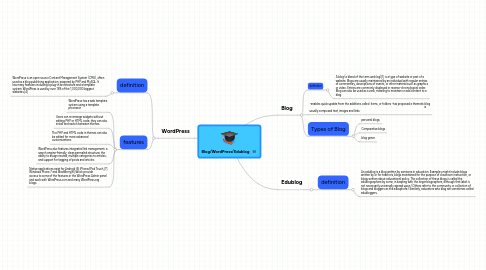
1. WordPress
1.1. definition
1.1.1. WordPress is an open source Content Management System (CMS), often used as a blog publishing application, powered by PHP and MySQL. It has many features including a plug-in architecture and a template system. WordPress is used by over 13% of the 1,000,000 biggest websites.[4]
1.2. features
1.2.1. WordPress has a web template system using a template processor
1.2.2. Users can re-arrange widgets without editing PHP or HTML code; they can also install and switch between themes.
1.2.3. The PHP and HTML code in themes can also be edited for more advanced customizations
1.2.4. WordPress also features integrated link management; a search engine-friendly, clean permalink structure; the ability to assign nested, multiple categories to articles; and support for tagging of posts and articles
1.2.5. Native applications exist for Android,[6] iPhone/iPod Touch,[7] Windows Phone 7 and BlackBerry[8] which provide access to some of the features in the WordPress Admin panel and work with WordPress.com and many WordPress.org blogs.
2. Blog
2.1. definition
2.1.1. A blog (a blend of the term web log)[1] is a type of website or part of a website. Blogs are usually maintained by an individual with regular entries of commentary, descriptions of events, or other material such as graphics or video. Entries are commonly displayed in reverse-chronological order. Blog can also be used as a verb, meaning to maintain or add content to a blog.
2.2. -enables quick update from the additions called items, or folders -has proposed a thematic blog is usually composed text, images and links
2.3. Types of Blog
2.3.1. personal blogs
2.3.2. Comparative blogs
2.3.3. blog genre
3. Edublog
3.1. definition
3.1.1. An edublog is a blog written by someone in education. Examples might include blogs written by or for teachers, blogs maintained for the purpose of classroom instruction, or blogs written about educational policy. The collection of these blogs is called the edublogosphere by some, in keeping with the larger blogosphere, although that label is not necessarily universally agreed upon. (Others refer to the community or collection of blogs and bloggers as the edusphere.) Similarly, educators who blog are sometimes called edubloggers.
